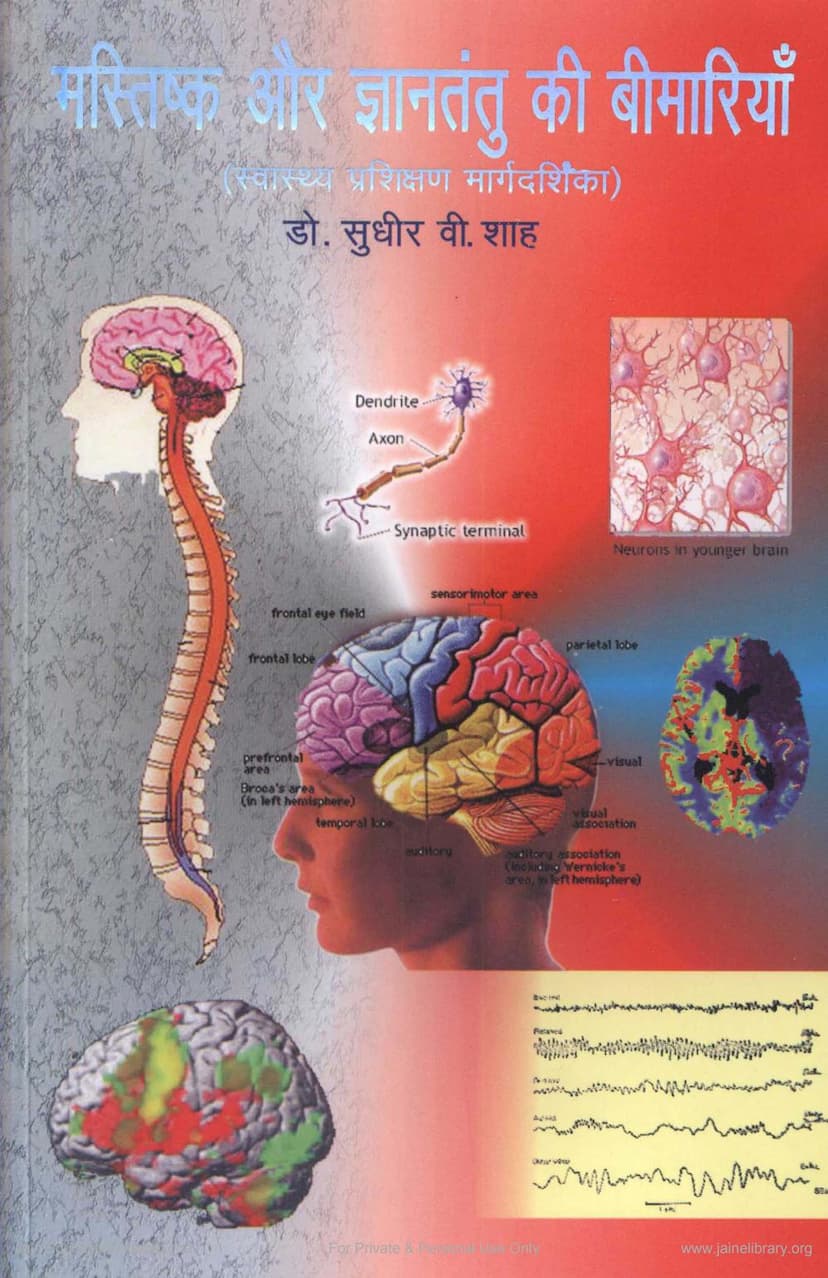Mastishk Aur Gyantantu Ki Bimariya
Added to library: September 2, 2025

Summary
This book, "Mastishk aur Gyantantu ki Bimariya" (Diseases of the Brain & Nervous System) by Dr. Sudhir V. Shah, serves as a comprehensive health education guide on neurological disorders. Dr. Shah, a renowned neurophysician, aims to provide accessible and informative content for the general public, medical students, and healthcare professionals alike.
The book highlights the complexity of the brain and nervous system, emphasizing their crucial role in overall bodily function. It addresses the common anxieties and lack of awareness surrounding neurological illnesses, aiming to empower readers with knowledge.
Key aspects covered in the book include:
- Introduction to the Nervous System: The initial chapters provide foundational information on the anatomy and function of the brain and nervous system, including the roles of neurons, synapses, and various brain regions.
- Diagnostic Tools: The book details various radiological investigations like X-rays, CT scans, MRI scans, and angiography used for diagnosing brain and nervous system disorders. It explains their principles, applications, and limitations.
- Major Neurological Disorders: The core of the book is dedicated to explaining common and significant neurological diseases. This includes detailed discussions on:
- Coma (Moorcha): Causes, symptoms, diagnosis (Glasgow Coma Scale), and treatment approaches.
- Epilepsy (Mirgi ke daure): Types of seizures, causes, management, and common misconceptions.
- Stroke (Pakshaghat/Lakwa): Types (ischemic and hemorrhagic), risk factors, warning signs (TIA), diagnostic methods, and treatment strategies including thrombolytic therapy and neurosurgery.
- Headaches and Vertigo: Different types of headaches (migraine, tension headache), their causes, symptoms, and management, as well as causes and treatments for vertigo.
- Movement Disorders: Conditions like Parkinsonism, Dystonia, Chorea, and Tremors, their underlying mechanisms (basal ganglia dysfunction, neurotransmitter imbalances), and therapeutic options including medication and advanced treatments like botulinum toxin injections and deep brain stimulation.
- Dementia and Memory Improvement: Various forms of dementia, particularly Alzheimer's disease and vascular dementia, their symptoms, diagnostic approaches, and strategies to enhance memory.
- Sleep Disorders: The importance of sleep, common sleep disorders like insomnia, sleep apnea, restless legs syndrome, and narcolepsy, along with their causes and management.
- Central Nervous System Infections: Detailed information on infections affecting the brain and spinal cord, including Tuberculosis (TB) meningitis, pyogenic meningitis, viral encephalitis, malaria, fungal infections, and AIDS-related neurological complications.
- Brain Tumors: Types, symptoms, diagnostic methods (CT, MRI), and treatment modalities involving surgery, radiation, and chemotherapy.
- Cerebral Palsy (CP): Understanding CP as a developmental disorder affecting motor function, its causes (prenatal, perinatal, postnatal), classification (spastic, dyskinetic, ataxic), associated conditions, and the importance of early intervention and rehabilitation.
- Myelopathy (Spinal Cord Diseases): Understanding the anatomy of the spinal cord and various conditions affecting it, including compression (due to tumors, disc prolapse, spondylosis), inflammation (myelitis), and degenerative diseases.
- Multiple Sclerosis (MS): Explaining MS as a demyelinating disease affecting the white matter of the brain and spinal cord, its varied symptoms, diagnostic tools (MRI, CSF analysis), and treatment approaches, including immunomodulatory therapies.
- Motor Neuron Diseases (MND): Discussing progressive muscle weakness and paralysis caused by the degeneration of motor neurons, including ALS, with a focus on their devastating nature and the limited treatment options available.
- Neuropathy: Covering disorders of peripheral nerves, including polyneuropathy (diabetic neuropathy, leprosy, toxic neuropathies), entrapment neuropathies (carpal tunnel syndrome), and their causes, symptoms, diagnosis (EMG/NCV), and treatment.
- Myasthenia Gravis: Understanding this neuromuscular junction disorder characterized by fluctuating muscle weakness, its association with the thymus gland, diagnostic methods, and treatment options like medication, plasmapheresis, and thymectomy.
- Myopathies: Discussing diseases affecting the muscles themselves, including muscular dystrophies, channelopathies, metabolic myopathies, mitochondrial myopathies, congenital myopathies, and inflammatory myopathies (polymyositis, dermatomyositis).
- Stress and Tension: The book addresses the impact of stress on the body and mind, differentiating between positive and negative stress, explaining the physiological "fight or flight" response, and providing practical strategies for stress management through lifestyle changes, relaxation techniques, and psychological support.
- Neurosurgery: Explaining the role of neurosurgery in treating various brain and spinal cord conditions when medical management is insufficient, covering surgical procedures for trauma, tumors, vascular abnormalities, congenital defects, degenerative diseases, and functional neurosurgery for conditions like Parkinson's and epilepsy.
- Neurological Medicines: Providing information on commonly used neurological medications, their indications, potential side effects, and the importance of prescribed dosages and regular monitoring.
- Hospitalized Patient Care: Offering guidance to family members on how to assist in the care of a hospitalized patient, covering aspects like managing oxygen, IV fluids, feeding tubes, urinary catheters, wound care, physiotherapy, and maintaining the patient's emotional well-being.
- Doctor-Patient Relationship: Emphasizing the importance of open communication, trust, and collaboration between patients, their families, and healthcare providers.
- Patient Information Guide: A directory of organizations providing support and information for various neurological conditions.
The book is praised by international experts for its clarity, comprehensiveness, and accessibility, making it a valuable resource for anyone seeking to understand and navigate the complexities of neurological health. Dr. Shah's humanistic approach to helping the world is evident throughout the text.